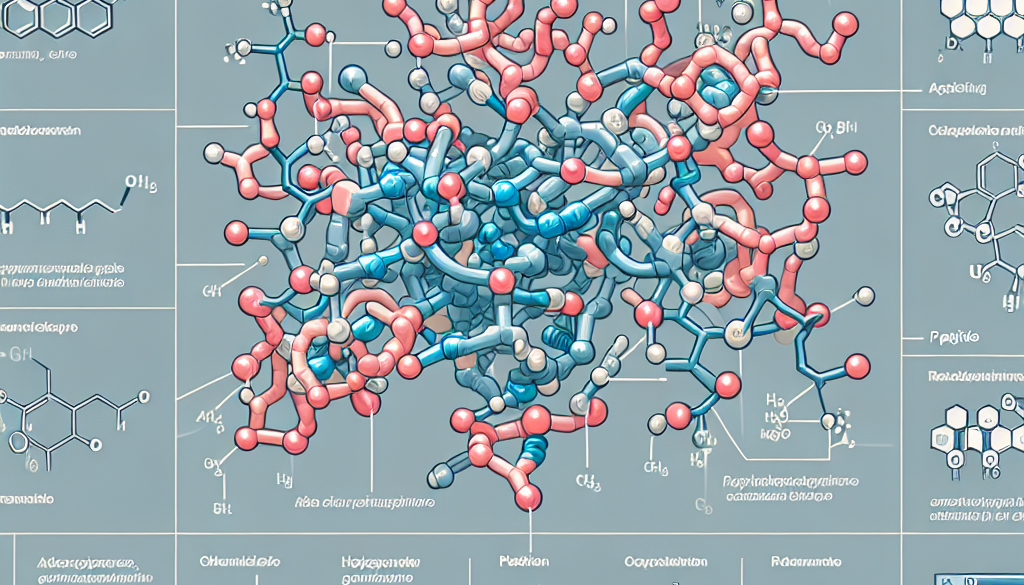Cysteine-Glutathione Disulfide: Key Facts
-
Table of Contents
- Cysteine-Glutathione Disulfide: Essential Insights and Implications
- Understanding Cysteine-Glutathione Disulfide
- The Role of Cysteine-Glutathione Disulfide in Cellular Processes
- Implications for Health and Disease
- Therapeutic Applications and Potential
- Research and Case Studies
- Conclusion: Key Takeaways on Cysteine-Glutathione Disulfide
- Enhance Your Health with ETprotein’s High-Quality Protein Products
Cysteine-Glutathione Disulfide: Essential Insights and Implications

Cysteine-glutathione disulfide, also known as glutathione mixed disulfide or GSSC, is a compound that plays a crucial role in the antioxidant defense system and the regulation of redox processes within the body. Understanding its function, synthesis, and implications for health is vital for both the scientific community and individuals seeking to maintain optimal well-being. This article delves into the key facts about cysteine-glutathione disulfide, exploring its significance, biological roles, and potential therapeutic applications.
Understanding Cysteine-Glutathione Disulfide
Before we explore the intricacies of cysteine-glutathione disulfide, it is essential to understand its components. Glutathione is a tripeptide composed of three amino acids: glutamine, cysteine, and glycine. It is a powerful antioxidant that protects cells from oxidative stress by neutralizing free radicals and reactive oxygen species (ROS). Cysteine, on the other hand, is a sulfur-containing amino acid that contributes to the antioxidant properties of glutathione.
The Role of Cysteine-Glutathione Disulfide in Cellular Processes
Cysteine-glutathione disulfide forms when an oxidized glutathione molecule (GSSG) reacts with a free cysteine residue through a disulfide bond. This reaction is reversible and plays a significant role in the regulation of the intracellular redox state. The balance between reduced glutathione (GSH) and GSSG is critical for cell survival and function.
- Antioxidant Defense: GSSC acts as a reservoir for cysteine, which is necessary for the synthesis of GSH. In times of oxidative stress, GSSC can be reduced back to GSH, providing additional antioxidant capacity.
- Signal Transduction: The redox state of a cell influences various signaling pathways. GSSC levels can modulate the activity of redox-sensitive proteins, affecting processes such as apoptosis, gene expression, and enzyme function.
- Detoxification: GSSC is involved in the detoxification of xenobiotics and endogenous toxins. It can conjugate with harmful substances, making them more water-soluble and easier to excrete.
Implications for Health and Disease
The balance between GSH and GSSC is a marker of cellular oxidative stress and has implications for various diseases. Abnormal levels of GSSC have been associated with conditions such as cancer, neurodegenerative diseases, cardiovascular diseases, and aging.
- Cancer: Tumor cells often exhibit altered redox states, with increased levels of GSSC. This can affect the sensitivity of cancer cells to chemotherapy and radiation.
- Neurodegenerative Diseases: Diseases like Alzheimer’s and Parkinson’s are characterized by oxidative stress and reduced levels of GSH. Modulating GSSC levels may offer therapeutic potential.
- Cardiovascular Diseases: Oxidative stress contributes to the development of atherosclerosis and other cardiovascular conditions. GSSC plays a role in endothelial function and vascular health.
- Aging: Aging is associated with a decline in antioxidant defenses, including GSH levels. Maintaining GSSC balance may help mitigate age-related oxidative damage.
Therapeutic Applications and Potential
Given its central role in redox homeostasis, cysteine-glutathione disulfide has been the focus of therapeutic research. Strategies to modulate GSSC levels include dietary supplementation, pharmacological agents, and lifestyle interventions.
- Dietary Supplementation: Supplements containing precursors to GSH, such as N-acetylcysteine (NAC), can boost GSH synthesis and influence GSSC levels.
- Pharmacological Agents: Drugs that target the enzymes involved in GSH metabolism may alter GSSC concentrations and have therapeutic effects.
- Lifestyle Interventions: Exercise and dietary choices can impact GSH and GSSC levels. Antioxidant-rich foods and regular physical activity can enhance the body’s antioxidant defenses.
Research and Case Studies
Several studies have highlighted the importance of GSSC in health and disease. For instance, research on the role of GSSC in cancer has shown that manipulating GSH/GSSC ratios can affect tumor growth and response to treatment. In neurodegenerative diseases, studies have demonstrated that boosting GSH levels can protect neurons from oxidative damage and improve cognitive function.
Case studies involving patients with cardiovascular diseases have revealed that antioxidant therapy, including GSH precursors, can improve endothelial function and reduce oxidative stress markers, including GSSC. These findings underscore the potential of targeting GSSC for therapeutic gain.
Conclusion: Key Takeaways on Cysteine-Glutathione Disulfide
Cysteine-glutathione disulfide is a compound with significant implications for cellular health and disease management. Its role in antioxidant defense, signal transduction, and detoxification underscores the importance of maintaining a proper balance between GSH and GSSC. Aberrant levels of GSSC are linked to various diseases, and strategies to modulate its levels offer promising therapeutic avenues. Continued research into the mechanisms governing GSSC dynamics will undoubtedly yield further insights into its potential for improving human health.
Enhance Your Health with ETprotein’s High-Quality Protein Products
If you’re looking to support your body’s antioxidant defenses and overall health, consider incorporating high-quality protein products from ETprotein into your diet. ETprotein offers a range of organic, non-GMO, allergen-free protein powders that can help meet your nutritional needs and support your body’s production of glutathione and other vital compounds.
About ETprotein:
ETprotein, a reputable protein and L-(+)-Ergothioneine (EGT) Chinese factory manufacturer and supplier, is renowned for producing, stocking, exporting, and delivering the highest quality organic bulk vegan proteins and L-(+)-Ergothioneine. They include Organic rice protein, clear rice protein, pea protein, clear pea protein, watermelon seed protein, pumpkin seed protein, sunflower seed protein, mung bean protein, peanut protein, and L-(+)-Ergothioneine EGT Pharmaceutical grade, L-(+)-Ergothioneine EGT food grade, L-(+)-Ergothioneine EGT cosmetic grade, L-(+)-Ergothioneine EGT reference grade and L-(+)-Ergothioneine EGT standard. Their offerings, characterized by a neutral taste, non-GMO, allergen-free attributes, with L-(+)-Ergothioneine purity over 98%, 99%, cater to a diverse range of industries. They serve nutraceutical, pharmaceutical, cosmeceutical, veterinary, as well as food and beverage finished product distributors, traders, and manufacturers across Europe, USA, Canada, Australia, Thailand, Japan, Korea, Brazil, and Chile, among others.
ETprotein specialization includes exporting and delivering tailor-made protein powder and finished nutritional supplements. Their extensive product range covers sectors like Food and Beverage, Sports Nutrition, Weight Management, Dietary Supplements, Health and Wellness Products, and Infant Formula, ensuring comprehensive solutions to meet all your protein needs.
As a trusted company by leading global food and beverage brands and Fortune 500 companies, ETprotein reinforces China’s reputation in the global arena. For more information or to sample their products, please contact them and email sales(at)ETprotein.com today.














